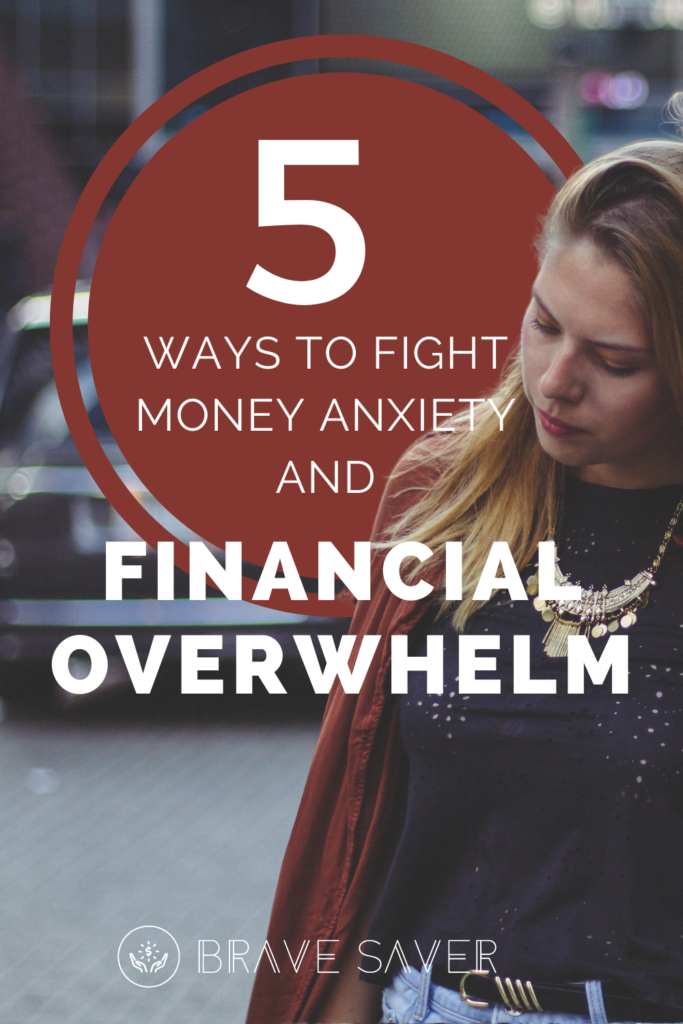
This post about dealing with financial overwhelm is one of the May posts I’m writing for Mental Health Month. See more of my posts about money and mental health here.
My house, currently, is a complete mess. More than a mess, it’s also disorganized and dirty. We’re getting to the “Lock the door and pretend that room doesn’t exist” level of disorder. I’m pretty sure we’ll all be sleeping in the living room within a week.
The current mess is the result of my family of four being stuck at home together for two months. Turns out, having everyone at home 24/7 means more messes and less time to manage them.
But now. Now there’s so much extra stuff to do, all the time, and so little time and energy to do it. And there is no escaping it, either. It’s all piled up to a point that I’m starting to feel that panicky tightness in my chest that I recognize as overwhelm.
What's in this post
My peak financial overwhelm: unemployed and $50,000 in debt
Thinking (stressing) about the house, I realized my overwhelm over a big, unsolvable mess feels awfully familiar.
I was in this space with my money from 2010-13. My financial overwhelm peaked during the first three years Moozh and I were married. We were young, broke professionals, trading off periods of unemployment.
In June 2012 we relocated to Los Angeles for the job Moozh found after grad school. The move more than doubled our living costs and barely increased our income. It also pushed our combined debt to its highest peak: across credit cards, a car loan, and student debt we owed just over $50,000.
Plus, I was out of a job. I spent months applying, occasionally interviewing, and mostly facing rejection. It wore me down and filled me with shame and even feelings of worthlessness. All while our money situation terrified me more and more.
How financial overwhelm kept me stressed and stuck
When dealing with overwhelm, it’s easy to get lost in all the things that need to get done. The overwhelm yells at me, “You’re in DANGER! Do SOMETHING, ANYTHING!” So I do, but it’s rarely the right thing.
Instead of finding sustainable ways to slowly improve my finances, I set impossible and unrealistic financial goals. I wanted to fix the problem as fast as possible, frantic to get relief from my own panic and dread. We would pay off our $5,000 credit card balance in two months, or die trying!
Is it any wonder I felt, at times, like my finances would be the death of me?
Opening our online bank account and reviewing transactions drained me. I’d review it, line by line, for all the ways I failed or didn’t do enough. I beat myself up over every purchase. Why did I think I could afford that $10 meal at McDonald’s? Who do I think I am, Warren Buffett??
The pressure and stress around money spun my mind into scarcity mode. I tried to tackle my biggest, hairiest financial problems to date with a completely stressed mind and less brain power, will, and emotional energy.
Financial overwhelm made my money problems giant, and any progress I made next to it was too small to even count. I couldn’t see how my ongoing efforts were making a difference, and I felt helpless and hopeless. It was too easy to say, “Why bother trying?” and give up.
My go-to strategies to beat financial overwhelm

I didn’t give up, though. By the end of 2012, I finally found a job and started to piece together enough of a money strategy that my finances felt under control.
It wasn’t perfect — it was actually very messy. And I still experience financial anxiety and periods of complete overwhelm. It hits when things feel so far gone and broken that we’ve run out of solutions. We’ve tried a lot and yet the big, stubborn problem remains. So what then?
Overwhelm is so hard to deal with because it’s inherently too much.
Truthfully, problems big enough to trigger overwhelm won’t get solved in a sprint or a scramble. It took me years to pay off debt and feel financially secure. It’ll probably take at least through the end of 2020 before my house is completely clean and organized again.
And even then, there will be new problems, new messes, new money emergencies or expenses.
But I’ve also acquired coping skills along the way that are more effective than the panic-and-scramble approach that used to be my only option. Here are the strategies I used today to deal with life or financial overwhelm.
1. Cover your money basics and stop breaking things
Before you start making a yearlong money plan to take down your debt or recover from a layoff? You gotta give yourself a stable today to work from.
Top priority: keep you and your family alive, healthy, and employed. That means staying on top of the expenses necessary for life and work.
Once you’re covering those, stop breaking things and contain the damage to what’s already done.
Work to catch up and keep up with the minimum payments debt an non-crucial accounts. If your credit has suffered or you’re behind on payments, work toward keeping up with on-time payments.
Maybe your income has fallen and you’re in the red every month. Look for ways to cut costs so you can live within your means and avoid taking on more debt.
Remember: It’s not about fixing the damage right now, it’s about stopping the financial bleeding.
2. Break down overwhelming problems into small tasks
Overwhelm is the symptom of an overloaded mind — so you need to start unloading the mind.
My go-to method to unload my mind is a “brain dump” or “mind sweep” (an idea that originates with David Allen’s “Getting Things Done” system). I sit down and list every single thing that’s stressing me out, big or small. I write until I’m done. This takes worries from hanging over my head to written out in front of me, where I can see and actually work with them.
From there, I prioritize what needs to get done, putting stars next to tasks that are urgent and need to be taken care of immediately. I’ll also highlight concerns that are weighing on me the most or causing other issues. This helps me identify high-impact actions that can provide the most benefit and relief.
Once I have one or two action items to start with, I break them down further. I list out every single step, and substep, until I have a series of microtasks, each of which can be completed in 20-30 minutes or less. As an example: I’m still working on filing my taxes, but I’ve broken that down to micro-tasks such as reconciling income statements for just one month of 2019.
Taking the time for this process of facing concerns, prioritizing them, then breaking them down is crucial.
First, it proves to our minds that our list of financial problems or to-dos are not, in fact, infinite — even if they feel that way. These steps also help us dial down panic because we know what’s happening, and we know where to put our attention.
3. Take your financial journey one day at a time
When I’m stuck in money worries, I stop and consider where and when I’m putting attending. Usually, I’m stuck somewhere else in time: in past financial regrets or future money stresses.
This worry does serve a (limited) purpose. Looking back helps me reflect and learn from past mistakes. And looking forward helps me make a plan for what I could do to avoid scary outcomes.
But the usefulness has run out when I’ve hit the point of overwhelm. At that point, I remind myself not to get distracted by regrets or future concerns. Those are outside of my immediate control, anyway. Instead, stay in the moment.
This is where my microtasks come in handy. Because I’ve gone through the process of breaking down the problems that are overwhelming me, I know each day:
- What very specific task I need to accomplish next
- That this task is small enough that I can fit it into my day
- That once that task is done, I get to stop worrying
Staying in today is a huge relief. It counters the toxic financial shame we feel over past mistakes with the knowledge that we’re taking the necessary steps to fix them. It alleviates the worry of the future, too. I know that just like I’m taking care of today, my future self will take care of tomorrow in turn.
4. Manage money stress and financial anxiety

Money stress often caused me to “act out” financially and indulge in unhelpful behaviors, such as emotional spending or procrastination of money tasks. I knew it was a problem, but my past, flawed solution to money stress was simple: I just needed to eliminate the stressor!
Again, however, that’s not usually realistic or possible with overwhelming financial problems. I’ve had to learn how to do two things at once: both work on the bigger issues that are causing the stress, while also working to manage the stress itself.
I needed to find better ways to manage my money stress and financial anxiety, independent of what was happening with my money. So I worked on developing self-management skills and strategies to cope with stress. I’ve practiced more effective de-stressing activities. And I also offer myself friendship and support.
Shifting how I approach my finances to make them little more “foolproof” has also helped. My budget some fuck-up fund and wiggle room built into it, which allows me to more easily let go of perfectionism. And I’ve automated a lot of smaller, daily money tasks, freeing up brain and will power to tackle more infrequent or strategic money actions instead.
5. Accept a slower pace to progress
Overwhelm tells us we have to have everything fixed right now. It tells us if we’re not always trying to do more, we’re lazy. If we slip up, we’re failures.
But overwhelm is a liar. Worse, it’s an unhelpful liar.
Believe its lies did not make me better with money — it kept me stuck in shame and panic.
Acceptance was the way out of overwhelm and shame, along with allowing for progress to simply take a long time.
“Most people overestimate what they can do in one year and underestimate what they can do in ten years.”
Bill Gates
Accepting where I was at on my money journey, and how slow and long it would be. That I was over $50,000 in debt, and I couldn’t pay this debt off overnight. And accepting that I wasn’t always going to be perfect with my finances, and I needed to plan for that.
By moving toward acceptance, I stopped fighting against the limits of what was possible and could make more progress within those limits. I recognized my own efforts and progress more easily, too, and gave myself more credit when I got it right. Once I let go of the quick fix, I could actually find the one that, though slow, actually worked.
I’m still scared about my money. I still worry. But I choose a grounded faith in myself and my financial journey. Faith that:
- Nothing is forever, and even the worst of times must pass.
- I will stick by my own side and help myself through the worst of it.
- Little by little, things will get better. My efforts will count.
- Sometime, years in the future, all this will add up to something beautiful that I’d previously only imagined.
To take it a little deeper…
- “Recovering emotionally from disaster” from the American Psychological Association provides a primer on our mental and emotional responses to crisis — and how to start the path to recovering.
- “7 Tips for Dealing With Financial Stress,” which I wrote for the Plutus Foundation, includes some incredible strategies for working through money stress and finding ways to cope.
- “It’s OK to feel overwhelmed. Here’s what to do next“ is a recent TED Talk from Liz Gilbert, recorded as a response to the recent pandemic crisis. She shares wisdom centered on how to grieve and persist through the darkest times, and find resilience — which she calls “our shared genetic inheritance.”
- “The Power of Money Mediocrity — Celebrate Financial Progress” by my friend Miranda Marquit is a must-read celebration of slow-but-steady money wins. “Money mediocrity is the name of my game,” she writes. “Rather than a stunning transformation, I simply have boring incremental financial progress.”
- “What happens after the brain dump?” is an episode of Taking Control: The ADHD Podcast that gives tips on how to use a brain dump or mind sweep effectively, not just once but as part of your ongoing system for managing tasks and energy.
Photos by Jessica Moore, Photo by Alex Iby, and Tim Goedhart on Unsplash





1 Comment
Charles @ That Charles life
May 16, 2020 at 3:36 amAs they say; what doesn’t kill you makes you stronger. This is a great personal share for those going through the struggle right now with the pandemic! Congrats on your successes thus far.
All the best,
Charles @ That Charles life